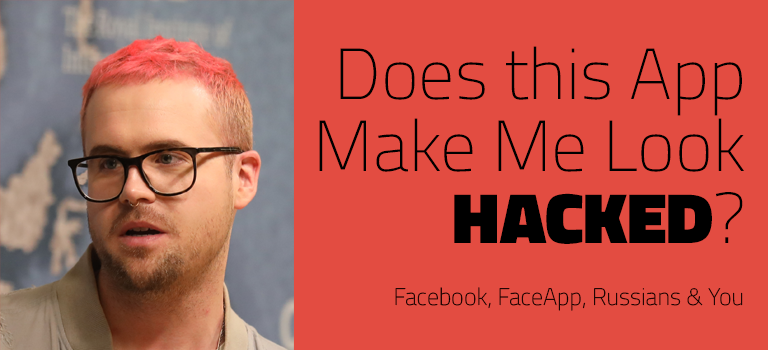Whether it’s the hottest game, the newest wave of pictures on Facebook, or that story you just MUST read to find out what happened, what we often fail to ask is, “but what about my privacy?”
In the days since Christopher Wylie appeared to testify in front of congress about things that we didn’t know we should be worried about, privacy fears have come, and gone. Like a fad that sends everyone into a water cooler gossip frenzy, the challenge of privacy is holding people’s attention. Do we care about our privacy? In many ways we do, but much like someone’s health, you always think you have it until you are confronted with information to the contrary.
What is health anyway?
While there are tools and metrics to measure health in variety of ways, we use health as a word meaning “not dead.” Privacy, and our concerns about it, tend to be just as accurate and self-aware. We are very concerned about our privacy once we find out we don’t have it. What we don’t want is someone stopping us from having fun to protect it.
We have a problem akin to a one-way mirror when it comes to both health and privacy. Our view is limited, we expose ourselves and see only our own reflection, we think ourselves healthy regardless of what the doctor states.
FOMO Because YOLO
Fear of missing out (FOMO) and You Only Live Once (YOLO), fun 21st-century acronyms to communicate the universal truth that all of us are responsible, until we aren’t. While commonly cited as “nothing ventured, nothing gained,” it is John Heywood in 1546 who is credited with “Noght veter noght haue spare to speke spare to spede. [Nothing ventured, nothing had – if you don’t speak, you don’t advance.]” While I’m sure #NVNHS2SS2S will never trend online like #FOMO or #YOLO, the reality is we’ve been throwing caution to the wind and doing what we want long before hashtags. We are a species that craves social connection, and we’re only ever a few friends away from exchanging privacy for inclusion.
And that’s a struggle for us in the field of technology, or, at least, it should be. Ultimately, it’s how many in the field make money. Profiting from human nature while also chastising and blaming it for doing the thing we well know they will do.
“The only truly secure system is one that is powered off, cast in a block of concrete and sealed in a lead-lined room with armed guards – and even then I have my doubts.”
–Gene Spafford, “Computer Recreations: Of Worms, Viruses and Core War” by A. K. Dewdney in Scientific American, March 1989
While his comment was in an age before “internet addiction” was a concept, and was specifically about the vulnerability of systems to attack, very little has changed in terms of how we handle security. What has changed are the number of people affected, and never has the personal computer been as personal as it is now.
Personally Impersonal
While riding this wave, we have all become aware there’s always cost. Freeware and shareware were only a teaser of the thing you wanted. Software and music downloads on file sharing services were the easiest way to get a virus. We know there’s always a price tag with free, so why are we surprised that when we shop with a budget of free in terms of currency that we must pay another way?
Most of Us Are Bad at Mathematic Word Problems
 Value can describe both something we hold in regard and the amount that we can pay to obtain something. What we’re not particularly adept at is calculating the exchange rate between a value, something we hold in regard, and a value, the price to obtain an object. While it’s true that we are afraid of missing out, and it’s also true that we may not always consider the consequences of our actions, there’s a much bigger problem at the center of exchanging privacy for inclusion. There’s a degree of expertise required to perform the calculation, one that most do not have.
Value can describe both something we hold in regard and the amount that we can pay to obtain something. What we’re not particularly adept at is calculating the exchange rate between a value, something we hold in regard, and a value, the price to obtain an object. While it’s true that we are afraid of missing out, and it’s also true that we may not always consider the consequences of our actions, there’s a much bigger problem at the center of exchanging privacy for inclusion. There’s a degree of expertise required to perform the calculation, one that most do not have.
If you’ve ever taken a trip and needed to utilize a foreign currency to make purchases, you know exactly what happens when value requires an exchange rate. No matter how savvy a consumer you are, your confidence in making purchases plummets and your ability to be taken advantage of skyrockets.
Your travel thoughts start to sound like, “is it $1.31CAD per $1USD or $1.31USD per $1CAD? If I spent $11.73CAD for breakfast, is that $8.97USD or $15.34USD? Oh, I’d love to get that backpack, how much is 285 pesos in US dollars?! Okay, okay, I can do this, you just take 285 and divide by 19.02, and…. Oh never mind.” One of the biggest reliefs in returning from your trip can be regaining your understanding of the relative value of money, no matter how proficient you are at calculating the absolute value. What we often take for granted at home, in terms of money, is that much of our spending is a relative thought. While the value of a currency and prices may change drastically between two points in time, they typically do so incrementally over time, and we adapt quickly to those small incremental changes and alter our understanding of the literal price and what it means for our budgets which inform us as to what we can afford.
 We’re trading privacy—a foreign currency to everyone—for digital goods and services. And google doesn’t have a calculator for that one. Ultimately, no one is good at it, because we’re been asked to exchange something that money should never be able to buy. But here’s what I’ll look like when we’re old enough to know what we’re doing.
We’re trading privacy—a foreign currency to everyone—for digital goods and services. And google doesn’t have a calculator for that one. Ultimately, no one is good at it, because we’re been asked to exchange something that money should never be able to buy. But here’s what I’ll look like when we’re old enough to know what we’re doing.

